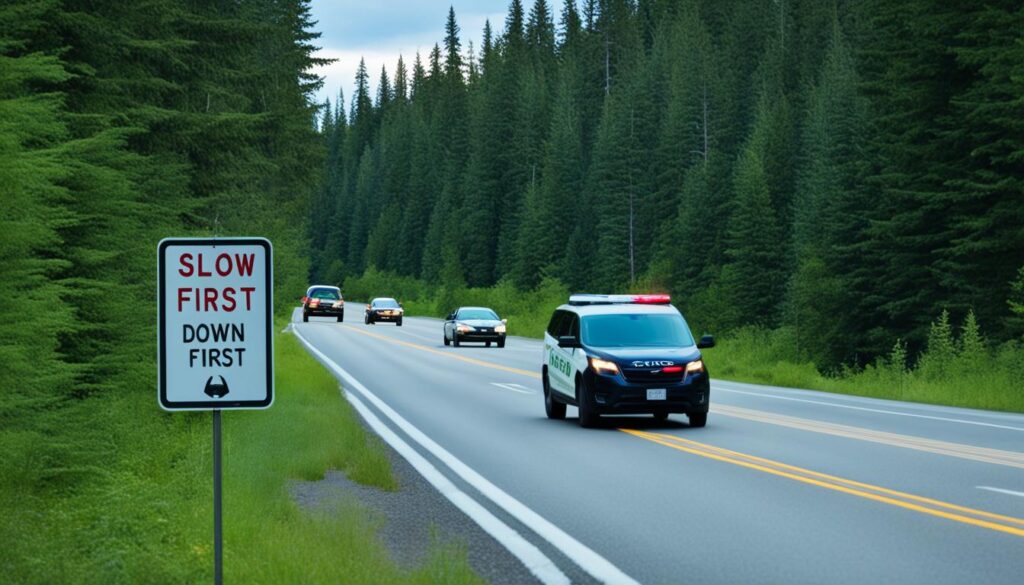Did you know that approximately 80% of drivers in Canada have witnessed road rage incidents in the past year? It’s a startling statistic that highlights the prevalence and impact of aggressive driving behaviors on our roads. The summer months, when frustration tends to increase, are particularly notorious for road rage incidents. As a driver in Canada, it is important to understand the dynamics of road rage, recognize aggressive driving behaviors, and know how to effectively handle these situations to promote road safety.
Key Takeaways:
- Road rage incidents are on the rise in Canada, with approximately 80% of drivers witnessing these incidents in the past year.
- Understanding the causes of road rage, such as frustration while driving and poor time management, is crucial in addressing the issue.
- Recognizing aggressive driving behaviors like speeding, aggressive lane changes, and tailgating helps in staying safe on the road.
- Strategies for dealing with aggressive drivers include staying calm, managing emotions, and reporting unsafe behaviors to the authorities.
- Practicing cooperative driving, being tolerant, and following defensive driving techniques can help in avoiding road rage incidents.
Understanding the Causes of Road Rage
Several factors contribute to the occurrence of road rage incidents. These include frustration while driving, distracted driving, poor time management, and self-entitlement.
Frustration while driving is a common trigger for road rage. Traffic congestion, long commutes, and heavy road construction can all contribute to elevated levels of frustration. Additionally, factors such as extreme heat or fatigue can further exacerbate emotions on the road.
Distracted driving is another significant cause of road rage. The use of mobile devices while driving has become increasingly prevalent and dangerous. When drivers are focused on their phones instead of the road, it can lead to impatience, erratic driving, and hostile behavior towards other motorists.
Poor time management can also contribute to road rage incidents. When individuals are running late or feel rushed, they may become aggressive and impatient on the road, taking unnecessary risks to save time.
Lastly, road rage can stem from behaviors rooted in self-entitlement or narcissism. Some drivers believe that they have the right to drive aggressively or disregard traffic rules in order to get to their destination faster, regardless of the consequences or the safety of others.
It is also important to consider the influence of the anonymity of driving. Without direct eye contact, individuals may feel less accountable for their actions, leading to more aggressive behaviors on the road.
| Causes of Road Rage | Description |
|---|---|
| Frustration while driving | Factors such as traffic congestion, heat, and fatigue can contribute to increased frustration on the road. |
| Distracted driving | The use of mobile devices while driving can lead to impatience, erratic driving, and hostility towards other drivers. |
| Poor time management | Feeling rushed or running late can result in aggressive and impatient driving behaviors. |
| Self-entitlement | Some drivers believe they have the right to drive aggressively or disregard traffic rules to save time. |
| Anonymity of driving | Without direct eye contact, individuals may feel less accountable for their actions, leading to more aggressive behaviors. |
Recognizing Aggressive Driving Behaviors
Aggressive driving behaviors can take various forms, and recognizing them is crucial for staying safe on the road. By being aware of these behaviors, drivers can take appropriate measures to protect themselves and others, potentially avoiding accidents and confrontations.
Some common aggressive driving behaviors include:
- Speeding
- Aggressive lane changes
- Tailgating
Speeding is one of the most prevalent aggressive driving behaviors. It not only increases the risk of accidents but also reduces the amount of time drivers have to react to potential hazards on the road.
Aggressive lane changes, such as cutting off other drivers or weaving in and out of traffic without signaling, can lead to collisions and create a dangerous environment for everyone on the road.
Tailgating, or driving too closely behind another vehicle, is another behavior that can escalate tensions and increase the likelihood of rear-end collisions.
It is important for drivers to be vigilant and recognize these aggressive driving behaviors in order to take appropriate action, such as maintaining a safe following distance, avoiding confrontation, and reporting aggressive drivers to the authorities when necessary. By doing so, we can all contribute to a safer and more harmonious driving experience.
Strategies for Dealing with Aggressive Drivers
When confronted with an aggressive driver, it is important to remain calm and focused to ensure personal safety. There are several effective strategies that can be employed to deal with aggressive drivers:
- Stay calm: It is crucial to remain composed and avoid engaging in confrontations with aggressive drivers. Responding with anger or aggression can exacerbate the situation and increase the risk of accidents or altercations.
- Manage your emotions: Taking deep breaths and practicing relaxation techniques can help regulate your emotions and prevent them from escalating. Keeping calm while driving allows you to make rational decisions and maintain control over your own behavior.
- Maintain a safe distance: Give aggressive drivers plenty of space by keeping a safe distance between your vehicles. This minimizes the risk of dangerous interactions and gives you more time to react if they engage in reckless behaviors.
- Report aggressive drivers: If an aggressive driver’s conduct poses a threat to your safety or the safety of others on the road, it is important to report them to the appropriate authorities. Provide a detailed description of the driver’s behavior, including their license plate number, if possible.
By applying these strategies, you can navigate encounters with aggressive drivers safely and help promote a more harmonious driving environment.
Stay Calm and Avoid Confrontations
“Remaining calm and composed when faced with an aggressive driver is essential for ensuring personal safety and preventing potential accidents or altercations.”
Staying calm while driving allows you to make rational decisions and respond appropriately to aggressive behaviors. Instead of retaliating or engaging in confrontations, focus on maintaining a safe driving environment for yourself and other road users.
Managing Your Emotions
“Taking deep breaths and practicing relaxation techniques helps manage emotions and prevent them from escalating, allowing for safer and more controlled driving experiences.”
When you feel your emotions rising, take a moment to center yourself. Deep breaths, counting to ten, or repeating calming affirmations can help you regain control over your emotions and prevent them from influencing your driving behavior.
Give Aggressive Drivers Space
“Maintaining a safe distance from aggressive drivers reduces the risk of dangerous interactions and provides you with more time to react to their unpredictable behaviors.”
Keep a safe distance between your vehicle and the aggressive driver’s vehicle. This allows you to have a clear view of the road ahead and provides you with the necessary time and space to respond to any sudden maneuvers or aggressive actions from the other driver.
Reporting Aggressive Drivers
“Reporting aggressive drivers to the authorities helps enhance road safety by holding individuals accountable for their dangerous behavior.”
If you witness an aggressive driver putting themselves or others at risk, report their behavior to the appropriate authorities. Provide as much detail as possible, including the driver’s license plate number, a description of the vehicle, and a clear account of the aggressive behavior observed.
| Strategy | Description |
|---|---|
| Stay calm | Remain composed and avoid confrontations |
| Manage your emotions | Practice relaxation techniques and regulate emotional responses |
| Maintain a safe distance | Give aggressive drivers space by keeping a safe distance |
| Report aggressive drivers | Notify the authorities of dangerous driving behavior |
Avoiding Road Rage Incidents
To avoid road rage incidents, practicing cooperative driving is essential. This means adopting a mindset of tolerance, forgiveness, and defensive driving techniques. By maintaining awareness of the surrounding environment and anticipating potential hazards, road users can significantly reduce the risk of getting involved in road rage situations.
Tolerance and Forgiveness
Cooperative driving involves being tolerant and forgiving of minor mistakes made by other drivers. It’s crucial to remember that everyone on the road is human and prone to errors. Instead of retaliating or becoming aggressive, I strive to remain calm and understand that unintentional errors can happen to anyone.
“Tolerance is the key to preventing road rage incidents. By understanding that we all make mistakes, we can create a more harmonious driving environment.”
When I make mistakes, such as taking a wrong turn or forgetting to use my turn signal, I make sure to apologize by indicating and acknowledging my error. This simple act of signaling an apology can help defuse tension and de-escalate potential road rage incidents.
Defensive Driving Techniques
Defensive driving is another crucial aspect of avoiding road rage incidents. It involves being proactive and prepared for any potential dangers or aggressive behaviors on the road. By utilizing defensive driving techniques, I prioritize my safety and the safety of others.
- Maintaining a safe following distance: I ensure there is enough space between my vehicle and the one in front to allow for sudden stops or maneuvers.
- Adhering to traffic rules and regulations: I obey speed limits, yield to other drivers when necessary, and use my signals to communicate my intentions.
- Anticipating potential hazards: I stay alert and keep an eye out for aggressive or erratic behaviors from other drivers, pedestrians, or cyclists.

By adopting defensive driving techniques, I am better equipped to handle unexpected situations and mitigate the risk of road rage incidents. It’s crucial to prioritize safety over personal frustrations, allowing for a more harmonious driving experience.
| Cooperative Driving | Tolerance | Forgiveness | Defensive Driving |
|---|---|---|---|
| Adopting a mindset of cooperation | Being tolerant of minor mistakes | Forgiving and understanding | Maintaining safe distances |
| Signaling apologies for mistakes | Practicing patience | Acknowledging human fallibility | Adhering to traffic rules |
| Respecting other drivers | Avoiding retaliation | De-escalating tension | Anticipating potential hazards |
Consequences of Road Rage
Road rage incidents can have severe consequences for both the individuals involved and society as a whole. The emotional turmoil and aggressive behavior exhibited during road rage incidents often lead to physical injuries, ranging from broken bones to traumatic brain injuries. The consequences, however, extend beyond the immediate physical harm.
In addition to physical injuries, road rage incidents come with significant financial costs. Victims may face substantial medical expenses to treat their injuries, including hospital stays, surgeries, and rehabilitation. Furthermore, legal fees can quickly pile up if the road rage incident leads to criminal charges, such as assault or reckless driving.
The financial burden doesn’t end there. Individuals responsible for intentional acts of road rage may face consequences that directly impact their vehicle insurance coverage. Insurance providers may cancel or refuse coverage for drivers involved in road rage incidents, leaving them financially responsible for damages, repairs, and potential lawsuits.
The Financial Costs of Road Rage Incidents
The financial costs associated with road rage incidents can vary significantly depending on the severity of the incident and the resulting damages. Below is an example that demonstrates the potential financial repercussions:
| Expense | Cost |
|---|---|
| Medical expenses | $10,000 |
| Legal fees | $5,000 |
| Vehicle repairs | $3,000 |
| Lawsuit settlement | $20,000 |
| Insurance premium increase | Up to 50% |
Note: The costs provided are for illustrative purposes only and may not reflect the actual expenses incurred in road rage incidents.
As demonstrated, the financial costs resulting from road rage incidents can easily amount to tens of thousands of dollars, if not more. This financial burden can cause significant stress, disrupt financial stability, and have long-lasting negative effects on an individual’s financial well-being.
It is crucial to recognize and address the consequences of road rage to prevent further incidents and ensure the safety and financial security of all road users.
Canadian Road Safety Efforts
Canada has been actively implementing various road safety measures to address and prevent aggressive driving behaviors, as well as reduce road rage incidents. These efforts aim to create a safer driving environment for all Canadians.
One of the key strategies in Canadian road safety is conducting public awareness campaigns. These campaigns educate drivers about the risks associated with aggressive driving and emphasize the importance of following traffic laws. By raising awareness and promoting responsible driving behaviors, the aim is to prevent aggressive driving incidents from occurring in the first place.
Driver education programs play a vital role in promoting road safety in Canada. These programs help new drivers develop the necessary skills and knowledge to become safe and responsible drivers. By educating drivers about the consequences of aggressive driving, these programs aim to instill a sense of responsibility and encourage respectful behavior on the road.
Law enforcement agencies also play a crucial role in ensuring road safety. They are responsible for enforcing traffic laws and regulations, including apprehending aggressive drivers. By actively addressing and penalizing aggressive driving behaviors, law enforcement agencies contribute to deterring such behaviors and maintaining a safe driving environment.

Seeking Professional Help
If you find yourself struggling with anger and prone to road rage incidents, seeking professional help can be extremely beneficial. There are various anger management resources available, including counseling services and programs designed to help individuals learn effective techniques for managing their anger and developing healthier coping mechanisms.
Professional psychotherapists and psychologists with expertise in anger management can provide the necessary support and guidance to address your aggressive behavior on the road. Through counseling sessions, they can help you explore the root causes of your anger, identify triggers, and develop practical strategies to regulate your emotions when faced with challenging situations on the road.
Anger management programs often utilize evidence-based therapies such as cognitive-behavioral therapy (CBT) or dialectical behavior therapy (DBT). These therapies can assist you in reevaluating and reframing negative thought patterns, enhancing emotional intelligence, building empathy, and improving communication skills.
“Recognizing the need for professional assistance is a strength, not a weakness. Seeking help demonstrates a commitment to personal growth and a desire to create positive and lasting change in your life.”
By working with experienced professionals, you can gain valuable insights into your anger triggers and learn effective conflict resolution techniques. They can also assist you in developing strategies for stress management and developing a more calming and constructive mindset while driving.
Remember, seeking help is a proactive step towards self-improvement and ensuring your own safety and the safety of others on the road.
Case Studies
Anger management resources and counseling services have helped countless individuals overcome their road rage issues and improve their overall well-being. Let’s take a look at some inspiring case studies:
| Case Study 1: John | Case Study 2: Sarah |
|---|---|
| John, a 40-year-old driver, regularly found himself losing his temper on the road and engaging in reckless behaviors. After seeking help from a psychotherapist specializing in anger management, John discovered deep-rooted anger issues stemming from unresolved childhood trauma. Through therapy, he learned coping mechanisms, mindfulness techniques, and anger regulation strategies. Today, John’s road rage incidents have significantly decreased, and he feels more in control of his emotions. | Sarah, a young professional dealing with high workplace stress, often let her frustrations manifest while driving. These anger outbursts not only affected her own well-being but also strained her relationships with friends and family. Seeking counseling services, Sarah learned to identify her triggers and developed healthier outlets for stress management. With newfound coping mechanisms, Sarah now approaches driving with a calmer demeanor and feels happier in all aspects of her life. |
Conclusion
Road rage and aggressive driving behaviors are dangerous and can have serious consequences for both drivers and passengers. To prevent road rage incidents and enhance road safety, it is crucial for individuals to prioritize safe driving practices, manage their emotions, and practice tolerance on the road.
By following safe driving practices, such as obeying traffic laws, staying focused and attentive while driving, and maintaining a safe distance from other vehicles, drivers can help prevent aggressive behavior and reduce the risk of road rage incidents. Additionally, managing emotions and practicing patience can go a long way in diffusing tense situations and promoting a more harmonious driving environment.
Furthermore, road safety awareness plays a vital role in preventing road rage. It is essential for all drivers to be aware of the potentially dangerous consequences of road rage and to understand the importance of promoting respect and understanding on the road. Education campaigns and public awareness initiatives can help raise road safety awareness and encourage responsible driving behaviors.
Ultimately, road rage prevention requires a multi-faceted approach that encompasses not only individual driver responsibility but also efforts from governing authorities, law enforcement agencies, and driver education programs. By working together, we can create a safer driving environment for all Canadians.
